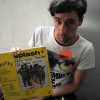Zahara - Loliwe
Artist: Zahara
Album: Loliwe
Label & Year: TS Records, 2011
By David Durbach
Weekends at the Fox Den, a downtown tavern boasting Jozi’s loudest soundsystem and cheapest beer, usually mean droning ultra-bass until well after midnight, much to the confusion of the hundreds of people living within spitting distance of the place. Yet this Saturday, the DJ chose to play a melancholy, near-drumless groove instead, twice in succession.
There’s something happening here - but what it is ain’t exactly obvious. Two and a half months ago, Bulelwa Mkutukana was another struggling musician from the Eastern Cape. Now she is being hailed as the saviour of the local music industry. Zahara’s debut album Lolilwe, released less than two months ago, struck gold (20 000) in just two weeks, and has gone on to rack up sales in excess of 200 000 (and counting) - at an unprecedented 4 000 CDs a day.
Unable to fathom her whirlwind success, skeptics remain convinced that it’s all a sham, a marketing ploy to boost an ailing record industry where even the so-called major labels are now running on skeleton staff. Perhaps those doubters are reluctant to believe that Zahara’s music can have such a massive appeal at a time when house producers rule the roost and are only matched by a handful of gospel heavyweights. Now here comes a young 24-year-old songbird, whose music - catchy acoustic pop with varying degrees of local influence - defies the soulless status quo, and blows her contemporaries out of the water.
Of course the key to her newfound popularity is the accessibility of her sound - far catchier and less dark or cerebral than Thandiswa and Simphiwe Dana, yet infinitely more soulful and down-to-earth than the likes of Lira, Asanda Bam or Siphokazi. Clearly, Zahara has found that happy medium that appeals to as wide an audience as possible. Her voice may not be quite so polished, but the sheer power and passion she puts out has proven enough to send her straight to the top of the list of Mzansi’s leading ladies. Also setting her above many of her peers are her songwriting and her acoustic guitar skills, enabling her to draws further comparisons to both the late Busi Mhlongo and US folk icon Tracy Chapman.
As with any great pop album, every song on Loliwe sounds like a hit, from the mellow soul of the title track, ‘Umthwalo’ and ‘Ndize’ to the reggae-tinged ‘Away’ and uptempo ‘Brand New Day’. Each carries distinctive melodies and messages that clearly resonate instantly with Zahara’s ever-expanding listenership.
So profound has her effect been that many have quickly developed a close emotional attachment not only to her music, but to the singer herself. Daily Sun ran a page 3 story (on 28/09/2011) about Thandisile Sidina, a fan who nearly died after he took on hawkers selling pirated Zahara CDs for five bucks a pop on Smal Street in the Joburg CBD. “I felt for Zahara because she has worked so hard to be where she is and they just want to pirate her music,” he told the paper. “I’m also an artist and because I love Zahara’s music, I decided to destroy the pirated CDs. That’s when these two men started to beat me with a steel bar and a brick.
“I thought I was going to die but that was not a problem for me because I am willing to die for Zahara! She has revolutionised our music industry and her music deserves to be protected.”
Interestingly, while most artists and critics tend to draw a huge distinction between western and African influences, Zahara effortlessly bridges the two. Although most lyrics are in isiXhosa and her voice undoubtedly draws comparisons to her local predecessors, the guitar and piano melodies are as sugary sweet as any international teen queen. ‘Xa Bendingena Mama’ and ‘Thekwana’ are the only tracks that carry a distinctly South African sound, the former rooted in the hills of the Eastern Cape, the latter a kwela/marabi bassline that echoes the song’s tribute to our nation’s heroes.
While hard-nosed critics may struggle to find anything unique or remarkable in her work, big sales have seldom been a sign of singular innovation. With Loliwe, Zahara doesn’t try to re-invent the wheel – she simply keeps it real, and checks all the right boxes in the process.
Originally published on 07.10.2011 at http://www.mahala.co.za/music/loliwe/(link is external)
































Comments
Log in or register to post comments